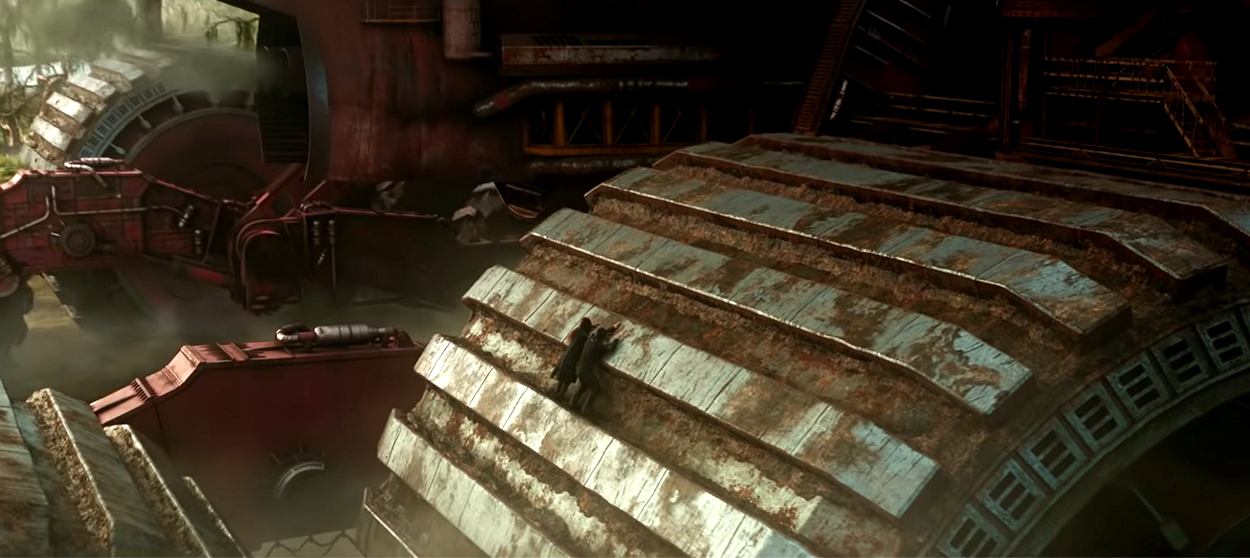Can Peter Jackson break the steampunk curse?
Why Mortal Engines might change the genre's fortunes


A free daily email with the biggest news stories of the day – and the best features from TheWeek.com
You are now subscribed
Your newsletter sign-up was successful
Is 2018 the year steampunk finally gets its big break on the big screen?
This month Peter Jackson, best known for bringing Middle Earth to Hollywood, presents another epic film with epic aspirations. Written and produced by Jackson, Mortal Engines is an adaptation of Philip Reeve's YA novel of the same name and depicts a futuristic world of cities that have evolved into giant, cannibalistic moving machines. The movie is rife with anachronisms: The characters collect contemporary technologies (laptops, smartphones, even toasters) but they exist alongside machinery that recalls the Industrial Age — think large gears, furnaces, and, yes, steam. These are the trademark elements of steampunk, a subgenre of science fiction that has never quite found its footing in live-action American cinema.
But perhaps Mortal Engines can break the steampunk curse.
The Week
Escape your echo chamber. Get the facts behind the news, plus analysis from multiple perspectives.

Sign up for The Week's Free Newsletters
From our morning news briefing to a weekly Good News Newsletter, get the best of The Week delivered directly to your inbox.
From our morning news briefing to a weekly Good News Newsletter, get the best of The Week delivered directly to your inbox.
In its narrowest definition, steampunk takes place in an alternative Victorian-era society in which fantastical machinery abounds. But in a broader sense, steampunk preoccupies itself with questions of time: time travel, time periods, and most importantly, technologies that are both of the time and outside of it. In its broadest sense, steampunk isn't even limited to genre; it's an aesthetic, a subculture marked by its fashion: bustles and gears, gadgets and top hats.
While the genre can trace its inspiration all the way back to 1927 with the release of the famous German silent film Metropolis, it's never really had a sustained run of success. Popping up only every few years, steampunk films generally suffer from middling-to-negative critical reviews or disastrous box office numbers.
The most famous steampunk disaster was probably 1999's Wild Wild West, starring Will Smith, Kevin Kline, Kenneth Branagh, and Salma Hayek in a gaudy, over-the-top circus of a production with more gadgets and hijinx than you could count. Cowboys on steam trains with ejecto-seats? Unmistakably steampunk — but also a failure. The movie, which had a production budget of $170 million, only grossed $113 million domestically. "The movie is all concept and no content," Roger Ebert snarked in a 1999 review. "The elaborate special effects are like watching money burn on the screen."
While Wild Wild West is certainly one of the most egregious failures of the genre, it was closely followed by a few others: The Time Machine (2002), which Ebert called a "witless" remake; The League of Extraordinary Gentlemen (2003), sadly unimpressive despite its rich source material; the painfully campy Around the World in 80 Days (2004); the utterly forgettable Sky Captain and the World of Tomorrow (2004), existing somewhere between steampunk and dieselpunk; and the gothic, gadget-heavy Van Helsing (2004).
A free daily email with the biggest news stories of the day – and the best features from TheWeek.com
A few years later, The Golden Compass (2007), based on the first novel in Philip Pullman's popular His Dark Materials trilogy, seemed promising but performed poorly in the United States and received mixed reviews. City of Ember (2008) similarly failed to make a blip on the radar, as did The Three Musketeers (2011).
In 2011, however, Martin Scorsese made waves with Hugo, which still failed commercially though swept stages at awards season. Even so, Hugo differentiated itself from its steampunk peers in a subtle way, drawing from the aesthetic while maintaining its grip on prestige filmmaking. Distinguished by its rich, romantic shots and gestures toward the art of filmmaking itself, Hugo was a highbrow take on the genre. (And, of course, the fact that it was made by Scorsese helped too.)
The seminal problem of many of these steampunk films has to do with identity. The tricky part of the genre, like its futuristic cousin cyberpunk, is how it's defined so broadly, how it by its very nature is a postmodern hodgepodge of different elements and thus frequently ducks between multiple genres: Is it sci-fi? Is it fantasy? The lines get blurred.
That isn't to say that all hybrid genre films are fated to fail. The problem is when the films engage in different individual elements to the hindrance of the cohesion of the final product. In a 2011 review of The Three Musketeers, AV Club writer Keith Phipps wrote that the film "can't decide if it wants to be an old-fashioned tale of swashbuckling adventure and palace intrigue or a cheeky, effects-heavy rethink of some iconic characters a la the Guy Ritchie-directed Sherlock Holmes. So it tries to be both at once, with annoying, if hardly disastrous results."
But another problem steampunk films face is one many other genre films face, of tone and the degree of realism versus sci-fi/fantasy. In the movies that dove headfirst into the genre, like Around the World in 80 Days and Wild Wild West, the result was mercilessly campy, shallow, and cartoonish. In the films that simply incorporated some elements of steampunk, like Van Helsing and The Three Musketeers, the inclusion felt unnecessary, a way to brighten up already flawed films. For a genre defined by illogical juxtaposition, of past meeting present (or future), so often its success depends on how well filmmakers can navigate the genre's contradictions within their films' own particular universes, incorporating them in a way that both makes sense and feels essential to the plot and overall world.
That said, steampunk hasn't been cursed to a fate of critical and commercial failure in every kind of filmmaking. Some animated films have had a decent showing of the genre. Though both still underperformed domestically, the animated 9 (2009) and Atlantis: The Lost Empire (2001) became cult favorites. And Hayao Miyazaki was known for flawlessly and imaginatively incorporating steampunk elements, from flying airships to intricate battleships, into his much-loved animated films, like Howl's Moving Castle (2004), Castle in the Sky (1986), and Nausicaa of the Valley of the Wind (1984).
But the question remains if a critically acclaimed and financially successful steampunk movie can change the genre's tide of poorly executed and poorly received films. For Mortal Engines to be successful, Peter Jackson will have to make history again.
Maya Phillips is an arts, entertainment, and culture writer whose writing has appeared in The New York Times, Vulture, Slate, Mashable, American Theatre, Black Nerd Problems, and more. She is also a web producer at The New Yorker, and her debut poetry collection, Erou, is forthcoming in fall 2019 from Four Way Books. She lives in Brooklyn.
-
 Local elections 2026: where are they and who is expected to win?
Local elections 2026: where are they and who is expected to win?The Explainer Labour is braced for heavy losses and U-turn on postponing some council elections hasn’t helped the party’s prospects
-
 6 of the world’s most accessible destinations
6 of the world’s most accessible destinationsThe Week Recommends Experience all of Berlin, Singapore and Sydney
-
 How the FCC’s ‘equal time’ rule works
How the FCC’s ‘equal time’ rule worksIn the Spotlight The law is at the heart of the Colbert-CBS conflict
-
 Walter Isaacson's 'Elon Musk' can 'scarcely contain its subject'
Walter Isaacson's 'Elon Musk' can 'scarcely contain its subject'The latest biography on the elusive tech mogul is causing a stir among critics
-
 Welcome to the new TheWeek.com!
Welcome to the new TheWeek.com!The Explainer Please allow us to reintroduce ourselves
-
 The Oscars finale was a heartless disaster
The Oscars finale was a heartless disasterThe Explainer A calculated attempt at emotional manipulation goes very wrong
-
 Most awkward awards show ever?
Most awkward awards show ever?The Explainer The best, worst, and most shocking moments from a chaotic Golden Globes
-
 The possible silver lining to the Warner Bros. deal
The possible silver lining to the Warner Bros. dealThe Explainer Could what's terrible for theaters be good for creators?
-
 Jeffrey Wright is the new 'narrator voice'
Jeffrey Wright is the new 'narrator voice'The Explainer Move over, Sam Elliott and Morgan Freeman
-
 This week's literary events are the biggest award shows of 2020
This week's literary events are the biggest award shows of 2020feature So long, Oscar. Hello, Booker.
-
 What She Dies Tomorrow can teach us about our unshakable obsession with mortality
What She Dies Tomorrow can teach us about our unshakable obsession with mortalityThe Explainer This film isn't about the pandemic. But it can help viewers confront their fears about death.
